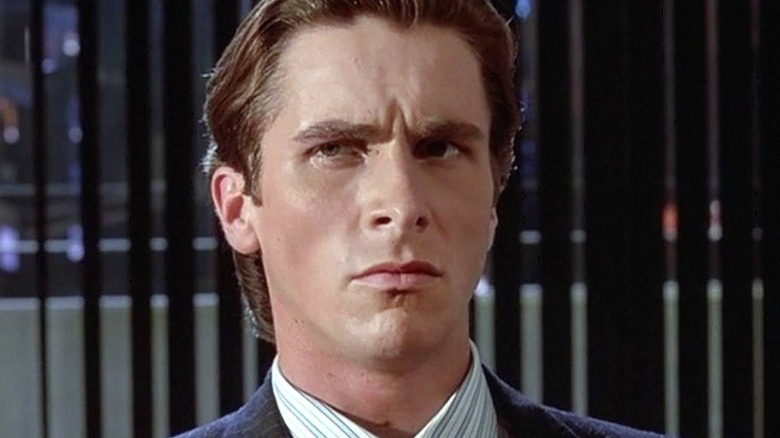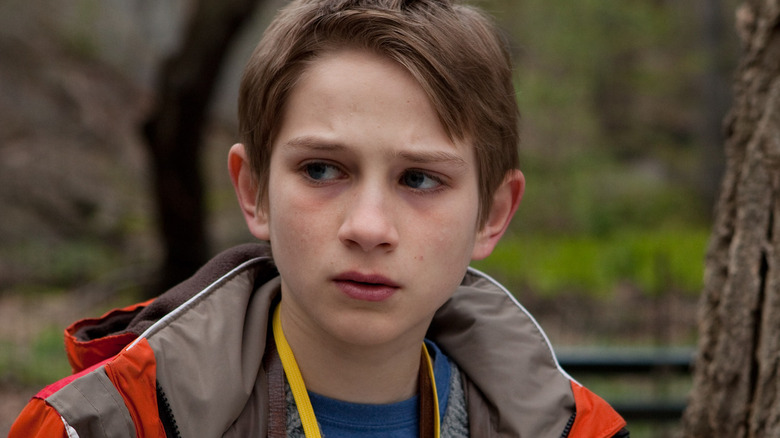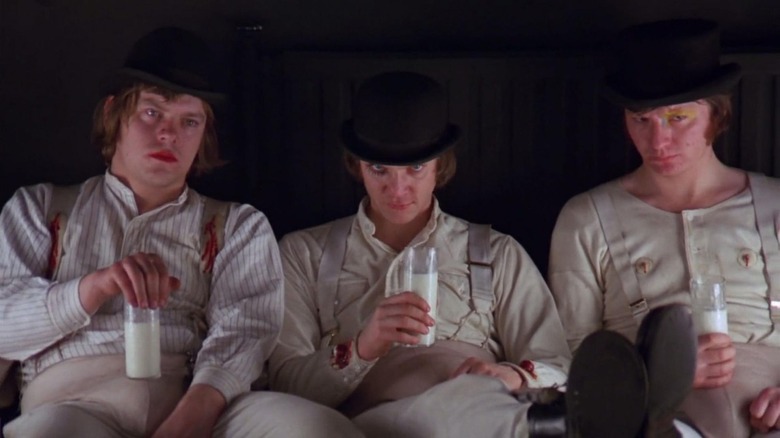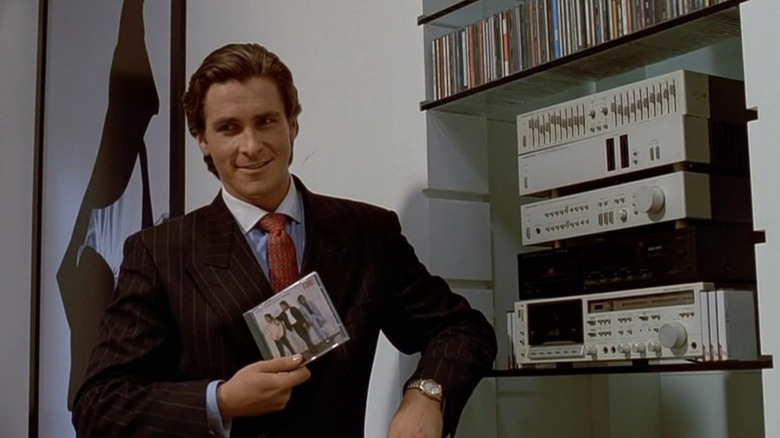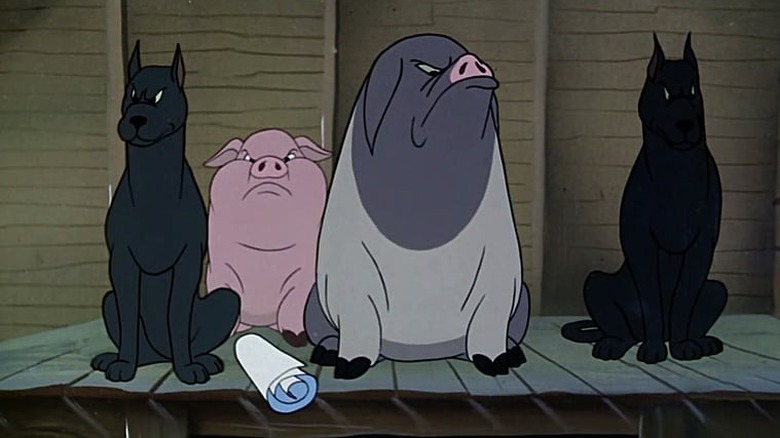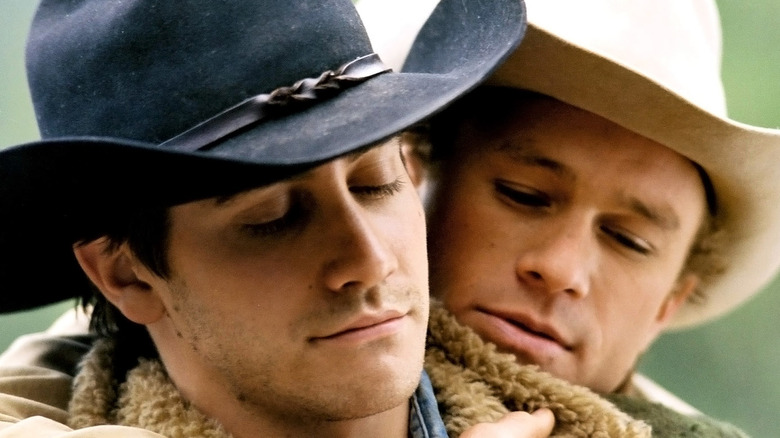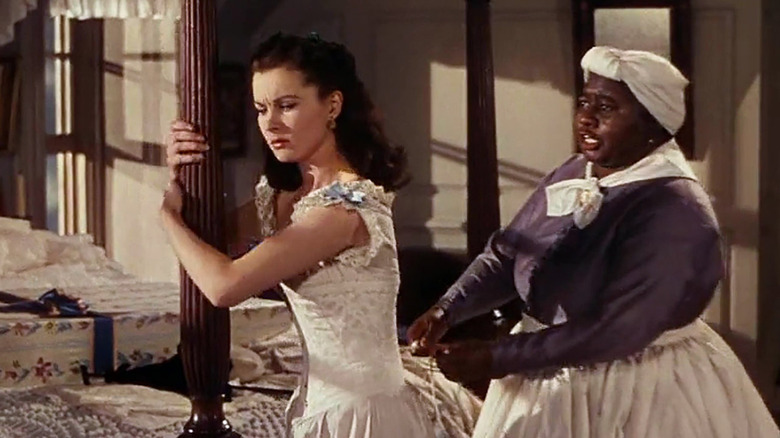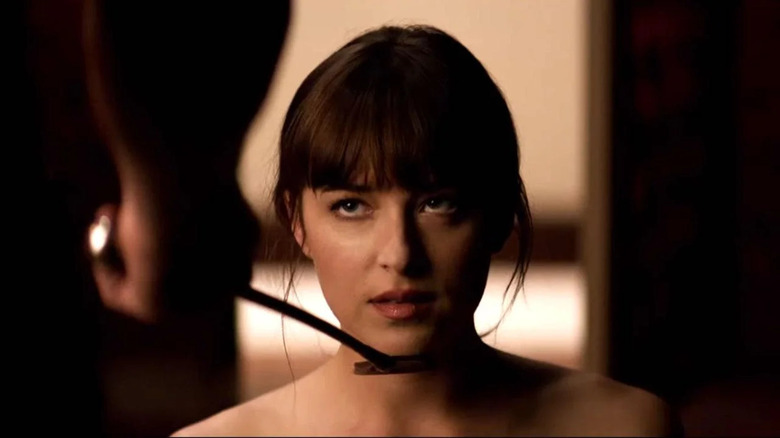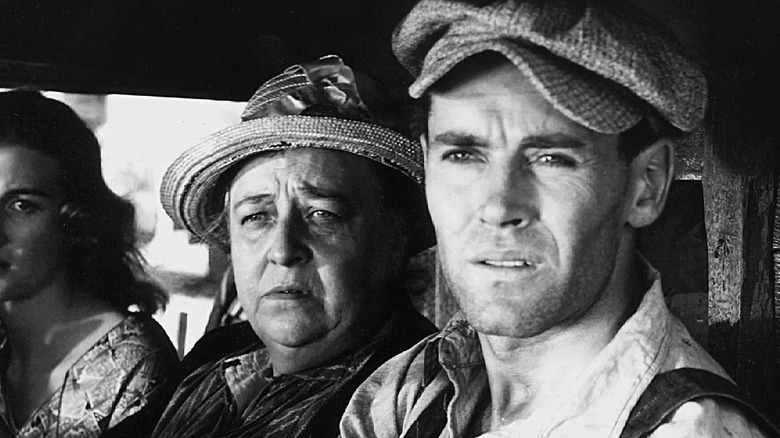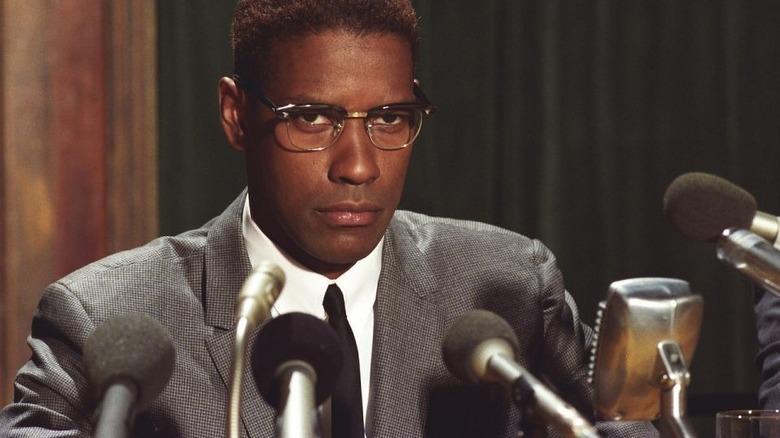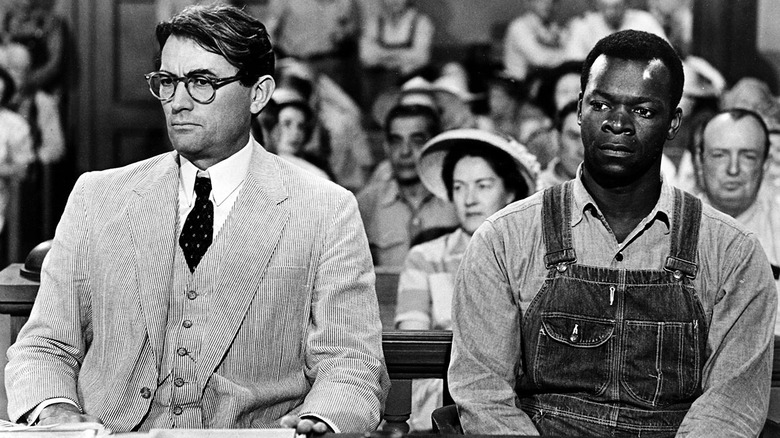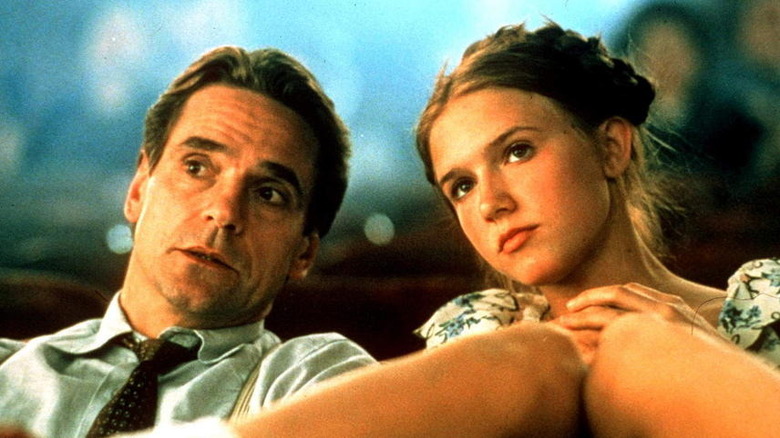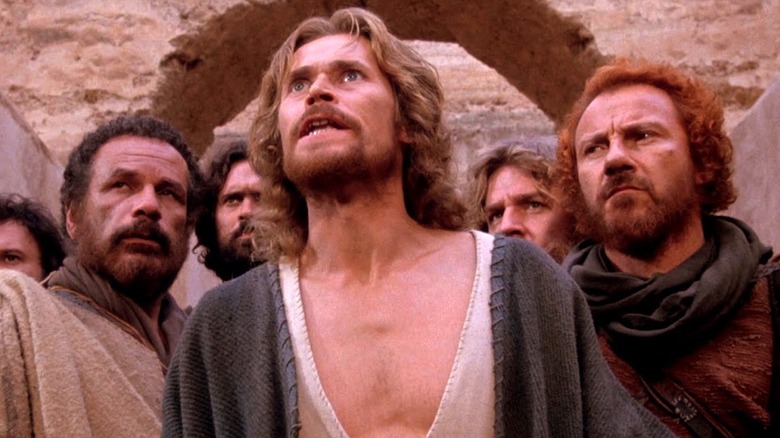Banned Books That Became Controversial Movies
Since the earliest days of cinema, novels and written stories have been an endless source of ideas for new movies, from timeless tales like "The Wizard of Oz" to war stories like "All Quiet on the Western Front." It's a trend that has never let up, as those celebrated works of fiction were adapted into films year after year, and newer works quickly making the leap to the big screen.
But it went beyond just the most populist, easily-digestible stories, as Hollywood has long held a fascination with controversial works of fiction. Books banned by religious and educational institutions for their salacious stories, harsh language, or fearless confrontation of taboo subjects have a long tradition of becoming popular — and equally upsetting — motion pictures.
In fact, many books that were boycotted and removed from schools and libraries had popular movie adaptations that were likewise condemned by various groups. Some have even sparked real-life violence, and waves of public outrage that often outstrips the controversy caused by their literary source material. So if you've ever wondered how a banned book went from page to screen or how audiences reacted to their production, we've collected some of the best right here for you to read all about.
Extremely Loud and Incredibly Close
Published in 2005, the novel "Extremely Loud and Incredibly Close" was written by Jonathan Safran Foer. Told from the perspective of a nine-year-old boy named Oskar Schell, it centers on a quest to learn about the father he never knew, who was killed in the terrorist attacks on 9/11. But the controversy that led to several schools banning the book didn't involve its discussion of terrorism — an understandably touchy and emotionally charged topic — but what WMFJ News called "a page of dialogue that included talk about sex acts, sexual situations and profanity" that complaining parents deemed far too adult in nature for high school students.
Eventually, not only did the novel wind up on the New York Times Bestseller list, it also finished on the infamous "Most Banned and Challenged Books List" of the decade too. In 2011, a film adaptation was released starring Thomas Horn, Max von Sydow, Sandra Bullock, and Tom Hanks. Though not controversial for quite the same reasons, it drew some harsh critical responses, particularly from survivors of 9/11 and New York reviewers who found its use of the tragedy exploitative.
The New York Post in its review said the film was sure to "nauseate every breathing American, particularly New Yorkers still suffering from post-traumatic stress," while accusing the filmmakers of "emotional blackmail, cheap thrills and a naked ploy for an Oscar." Though a family member of one of the victims of 9/11 urged a boycott of the film (per CT Insider), general audiences seemed less offended in their reactions.
A Clockwork Orange
Thanks to several graphic depictions of sexual violence, Anthony Burgess' dystopian sci-fi classic "A Clockwork Orange" was the subject of bans from numerous institutions in the 1970s, particularly in Colorado, Connecticut, Alabama, and Florida, as documented by Eliana Cohen of The Banned Books Project. But the novel sadly became even more notorious for the prosecution of Carol Grant, a bookseller from Utah who had carried the book in her shop in defiance of an apparent ban (per The New York Times), though authorities eventually dropped the case.
Less than a decade after its publication in 1971, acclaimed director Stanley Kubrick adapted the book for the screen, and the movie itself faced some stiff controversy itself. Not content to write around the book's more disturbing plot points, the film version was initially rated X for its scenes including sexual assault, while several religious groups condemned the film in literal terms, forbidding members of the faith from viewing it, as chronicled in the book "Roman Catholicism in America" by Chester Gillis.
Two years after its release, the film was blamed for a UK murder, and Kubrick himself pulled the film from exhibition in the country after a number of criminals began using it in court to defend violent crimes (per AFI). Despite the hullabaloo, Kubrick's adaptation is widely regarded as one of the best sci-fi movies of all time.
If you or anyone you know has been a victim of sexual assault, help is available. Visit the Rape, Abuse & Incest National Network website or contact RAINN's National Helpline at 1-800-656-HOPE (4673).
American Psycho
Released in 2000, the psychological horror/slasher film "American Psycho" helped make Christian Bale a star. He played the role of Patrick Bateman, a sociopathic New York investment banker who is also a secret serial killer. A spiritual precursor to the likes of "Dexter," the film was filled with blood, gore, and sex, which riled up plenty of critics. But filmmaker Mary Harron's adaptation also caused an uproar not just for its over-the-top violence, but for inspiring an entire generation of misogynistic young men who seemed to miss the movie's point, as explained by The Washington Examiner.
Based on a 1991 novel by Bret Easton Ellis, its source material was no less controversial, and is one of the most challenged and banned books of the decade. Even before its release it had trouble finding a publisher, with Simon & Shuster bailing on it at the last minute. When it saw print from a smaller outfit, plenty of outlets like The New York Times were horrified, seeing it as little more than trash, and a harmful statement against women.
The book's publication caused a media firestorm, with a cover story in New York Magazine and segments on CNN, as chronicled by Entertainment Weekly. The National Organization for Women spearheaded a boycott campaign, and the sale of the book to minors has been banned in Australia for decades. In 2015, ABC News reported that the book was again pulled from shelves in Adelaide when it was found for sale without a required black wrapping.
Animal Farm
George Orwell stands among the most influential political satirists and social critics of the 20th century, with his seminal masterpiece "1984" giving rise to terms that have remained in the lexicon, like "Big Brother" and "The Thought Police." His 1945 novel "Animal Farm" was no less influential. Centered on a roster of farm animals who face abuse at the hands of their human masters, they take back control only to find themselves at the mercy of a group of tyrannical pigs.
An incisive takedown of authoritarian structures, the movie uses allegory that's anything but subtle in a cautionary tale about the inevitability of corruption in systems of power. But with all that can be learned from it, those in power have sought to suppress it: it faced bans in Wisconsin and New York in the 1960s and Florida in the 1980s. Though a staple of school reading in many regions, it sadly continues to face challenges today, with a district in Connecticut removing the book in 2017.
1954's big screen version of "Animal Farm" was the first animated feature film produced in Britain. Perhaps surprisingly, the film had been propped up by the American CIA, who helped fund the film to use as anti-communist propaganda (per The New York Times). But this meant changing the book's cynical ending, which showed the ruling pigs and humans becoming indistinguishable as evil authoritarians. The animated film concludes with the pigs being deposed, a change that has always infuriated Orwell purists.
Brokeback Mountain
Written by Annie Proulx, "Brokeback Mountain" was a short story from 1998. The tale of two Wyoming cowboys who carry on a secret relationship behind the backs of their unsuspecting family and friends. The collection of stories it appeared in was a contender for the 2000 Pulitzer Prize for Fiction, but it also met with its share of controversy thanks to its gay romance. In 2005 a private school in Texas was challenged to remove it from their optional reading list by a mega-donor who called the story "pornographic material concerning deviant behavior" (per The Austin Chronicle). It remains frequently celebrated during banned book week (per Ms. Magazine).
The same year it faced challenges in Texas, a big screen adaptation from director Ang Lee arrived in theaters and caused even more controversy. Despite rave reviews, the film was the subject of boycotts and bans even broader than the original story. A school viewing of the film led to a major lawsuit (per CBS News), while a theater in Utah refused to show it, as recounted by The Guardian. It was banned in China for its depiction of homosexuality, while the Bahamian government faced backlash from a similar censoring.
Despite all the hubbub however, the film version of "Brokeback Mountain" was a big hit. At the next year's Academy Awards it collected eight nominations, taking home three trophies. But with a higher profile came more scrutiny, and in 2010, the book was banned in Texas prisons alongside works by John Grisham, Joyce Carol Oates, and Jenna Bush (via The Guardian).
Gone with the Wind
One of the biggest movies of its day, "Gone with the Wind" is also based on a controversial novel of the same name. A coming-of-age story set amid the chaos of the American Civil War, the story centers on Scarlett O'Hara, the daughter of a wealthy plantation owner who loses everything after Sherman's March. Recipient of the 1937 Pulitzer Prize for Fiction, the book was quickly adapted into a major motion picture that remains one of the biggest box office hits of all time, accounting for inflation, per Box Office Mojo.
A product of its time, the film was full of sympathetic depictions of slave owners and problematic angles on race relations that have become uncomfortable relics of a different era. As such, both the book and film have been met with boycotts and bans over the years. But not long after its publication the book was actually banned by the Nazi Party during World War II because of its themes of war-time rebellion, the same reason it drew bans by the communist regime in the Soviet Union (per The Coloradoan).
In the decades since, it's found itself banned stateside, with schools across the country finding its use of racist language and its depiction of slavery troublesome, even in a historical context. Meanwhile, the movie has aged just as poorly, with many feeling it's art that's better left in the past, and it was recently pulled from streaming service HBO Max due to similar concerns (via The New York Times).
50 Shades of Grey
Originally written as a steamy piece of "Twilight" fan-fiction, the book "50 Shades of Grey" proved so popular that its author E.L. James rewrote it for publication as an original story (via Business Insider). Quickly becoming a big seller, the book was the first in a series of novels about a naïve young woman who is drawn into a passionate love affair with a wealthy tycoon. But as a work of erotic fiction, the book's allure was its salacious look inside a BDSM relationship. As you might imagine, this made it the target of campaigns by concerned decency groups who saw it as little more than pornography.
Released in 2011, the book was swiftly banned across the country and around the world, with a number of libraries in Florida putting the kibosh on carrying it, which drew plenty of media attention (per The Guardian). But the controversy only fueled Hollywood's interest, and before long a movie arrived starring Dakota Johnson and Jamie Dornan, and it too drew the wrath of various concerned conservatives. This includes the National Center on Sexual Exploitation, who viewed the film as glamorizing the sexual abuse of women (via ABC News), while a number of religious groups were incensed by what they viewed as an attack on "Christian marriage and the on the moral and spiritual strength of God's people," as reported by Deadline.
Despite all the rigmarole, the film adaptation earned more than half a billion dollars. Combined with its two successful sequels, the franchise on the big screen amassed a whopping $1.3 billion at the global box office.
The Grapes of Wrath
Another Pulitzer Prize winner, John Steinbeck's "The Grapes of Wrath" was published in 1939 and tells the story of a poor Oklahoma family who leave for California during the Great Depression to start new lives. Covering the plight of the poor in some of America's harshest times, the book has found its way into schools for decades and become one of America's most beloved novels. But it wasn't without its critics, who slammed the book's use of profane language, not to mention several mentions of sexual situations (per Study.com).
But beyond the surface level objections, some conservative groups saw the novel as a rebuke of American individualism, a perception heightened by the fact that Steinbeck was thought to be a communist. Eventually, the book was banned in schools in New York, Iowa, Illinois, North Carolina, and beyond, as noted by the American Library Association.
Given the ballyhoo, it should come as no surprise that when a movie version came around just a year after the book's publication, it too caused quite a stir. Starring Henry Fonda and directed by renowned filmmaker John Ford, the movie became a cinema classic. But when 20th Century Fox first signed up to make the movie, the California Chamber of Commerce and others condemned the film and threatened a boycott of the studio (per The Kansas City Library). Thankfully, producer David Zanuck stood his ground, and while the film did make some notable changes to the book, it earned Ford an Oscar.
Malcolm X
Malcolm X was one of the most complicated and controversial figures of the 20th century Civil Rights movement. Though never a violent man himself, he did not subscribe to the same screed of passive resistance as his contemporary Martin Luther King, and was often vilified for his aggressive stance on issues. In October of 1965, just months after his assassination, "The Autobiography of Malcom X" was published, and it became almost as divisive as the Islamic leader himself.
A groundbreaking biography that forced readers to rethink deeply held beliefs, it was sometimes seen as a primer for radicalism and revolution, and as a result it faced serious backlash (via The Censorship Files). This included bans in schools enacted by educators who forbade the book based on their own fears and prejudices, seeing Malcom X's stances as "anti-white." As recently as 2014, a New York teacher banned the book in his classroom, proving that we still have a long way to go.
In 1992, Spike Lee directed a film about the life of Malcolm X starring Denzel Washington, largely based on the autobiography. This time, the project upset not white America or conservatives, but supporters of Malcolm X himself who feared the movie would harm the leader's legacy. Amiri Baraka, a renowned poet, publicly denounced the film as a sanitized version of Malcolm X's story. "We will not let Malcolm X's life be trashed to make middle-class Negroes sleep easier," Baraka said, as noted by Newsweek at the time.
To Kill a Mockingbird
Written at the height of the Civil Rights movement, Harper Lee's "To Kill a Mockingbird" was also the winner of the Pulitzer Prize. It told the story of Atticus Finch, a well-respected lawyer who takes up the case of Tom Robinson, a Black man accused of sexually assaulting a girl in the segregated South. In the course of the story, Finch and his children, Jem and Scout, are suddenly faced with violence driven by bigotry. Released during the Jim Crow era, the book's examination of poverty, race, and gender made it the focal point of outrage for the same reasons it became lauded by scholars.
With an uncompromising look at the reality of intolerance, bigotry, and sexual violence, "To Kill a Mockingbird" remains one of the most banned and continually challenged books in American literature. To this day it continues to be pulled from reading lists in schools for its use of frank language and its harsh look at these serious issues (per Marshall Libraries). Through the decades it has faced more than mere bans, however, with protests on both sides leading to clashes between hard-liners and free speech activists, per History.com.
When the movie adaptation hit screens in 1962, it didn't escape controversy, with theaters in Alabama reportedly refusing to show it (per WSBTV). Others felt the movie was a statement against capitalism, a belief that spread to Soviet leader Joseph Stalin, who promoted the film as showing the evils of American ideals (per The Independent). Surprisingly, the tactic backfired, as Russian audiences reportedly felt that the movie showed the lower classes in America as better off than themselves.
Lolita
The acclaimed novel "Lolita" by Vladimir Nabokov understandably caused a kerfuffle with its story of a middle-aged man who becomes sexually involved with Dolores, a 12-year-old girl. Despite being viewed as a masterpiece of writing, it was labeled pornographic by many critics, and was even banned in the UK where British Customs officials were said to have seized copies on entry (via The Telegraph). It was also forbidden elsewhere around the world, including at different times in Argentina, New Zealand, and France (per The Daily Tarheel), and for more understandable reasons than most on this list. Despite the book's elegant prose, its premise is both taboo and vile.
In 1962, just seven years after the book's release, a feature film from celebrated director Stanley Kubrick arrived starring James Mason and Sue Lyons. But while the character of Dolores was slightly aged up, the movie's premise was no less unsettling for many, causing a brouhaha that began with British Board of Film Censors handing down an "X" rating, while Ireland refused to allow the film at all, as noted in The New York Times.
Some 35 years later, the debate over whether the story was merely pornography or art was still raging when a 1997 remake starring Jeremy Irons and Dominique Swain landed, creating its own controversy as several film distributors refused to carry it (via South Coast Today).
The Last Temptation of Christ
There have been many biblical epics that chronicled the life and times of Jesus of Nazareth, and many have gone on to major acclaim. But when "Taxi Driver" director Martin Scorsese wanted to provide his own grittier, more grounded, less pious take on the saga, it caused serious problems for religious groups. Starring Willem Dafoe, Harvey Keitel, and David Bowie, it sparked widespread outrage for what the film itself called a "fictional exploration of the eternal spiritual conflict."
But the controversy surrounding "The Last Temptation of Christ" was more than just protests and screening boycotts. Organized efforts to have the film banned included radio spots and letter-writing campaigns, culminating in some 150 theaters refusing to exhibit the film (per PBS). Things got so bad, in fact, that the movie's star and director were even subjected to death threats. Worse yet, at a late night screening of the film in Paris, a theater was bombed in an infamous terror attack that seriously injured at least ten people (via UPS).
But Scorsese shouldn't have been surprised by all the hoopla, because the movie was actually based on a book that was just as contentious. Released in 1955, the novel faced protests from religious institutions around the globe, leading to bans in several countries, according to BannedLibrary.com. Response from the Catholic Church in author Nikos Kazantzakis' home country of Greece nearly got him excommunicated, and the Church refused to allow him to undergo traditional funeral rites following his death, per The Washington Post.
